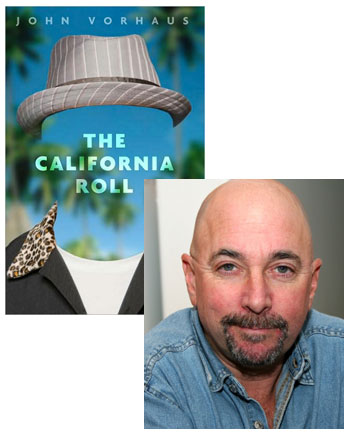John Vorhaus: Do What You Love, & Don’t Leave Money on the Table

The California Roll reads like Charles Willeford skirting the edge of slapstick. It’s a rollicking yarn about a lifelong grifter who suspects that he’s now on the receiving end of a con… but, at least in the opening third I read this weekend, he still can’t resist staying in to see what’s going to happen next. Kudos to John Vorhaus for creating such an effective voice: Yes, Radar Hoverlander is an unreliable narrator, but I’m still not sure whether it’s because he might be lying to me or because he’s missing a big piece of the puzzle, and I’m sticking around until I find out which it is. In the meantime, Vorhaus has a great story to tell us about making the segue from a poker handbook franchise to sunshine noir by way of Russian sitcoms…
Half a lifetime ago, I was a recreationally professional poker player trying to subsidize my writing habit with my card habit. Given that feeding one’s habits rarely makes the best business model, that worked out about as well as you’d expect. But from the detritus of my failed poker career emerged the cottage industry of writing about poker, which endeavor at least partly subsidized my other ongoing heavy addiction of the time: beating my head against Hollywood. For years I toiled in the magazine mines, pulling down double-digit paychecks often enough to keep a tar paper roof over my head and my rattletrap Chevy Citation in o-rings and oil.
In 2003, poker got hot, like flu epidemic hot, and I parlayed my magazine cred into six poker strategy books, plus one on home poker and one on strip poker. Did I really have that much to say about poker? I wasn’t sure, but I sure wasn’t going to let the opportunity slide by, for I had no illusions. Poker was a breaking wave that likely would never break so large and shapely again. I caught that bad boy and rode it for all it was worth. We poker players (even we abortive recreational professional ones) have a saying: Never leave money lying on the table. That’s why I wrote all those poker books.
The one on strip poker, too.
Do I sound savagely avaricious? I think I sound practical. By then I’d identified the habit I was really trying to support – not poker, not writing, but just pure freedom. I’d become determined to spend my days as I saw fit, and how would that happen if I didn’t seize such opportunities as come my way?
9 March 2010 | guest authors, uncategorized |
Building Strong Online Communities Around Your Blogs
A few months ago, I got on the phone with John Scalzi and Teresa Nielsen Hayden and peppered them with questions about how they had cultivated the robust communities that have sprung up in the comments sections of their respective blogs for a magazine called Associations Now. That conversation is now online, and I’m really pleased with how the article turned out. Here’s a sampling of their advice:
Nielsen Hayden: You know the theory that one of the things you have to do to keep communities from falling into crime is to fix the broken windows? The same thing happens on a website. When people first come into it, they look around and they see what’s happening there, and if they have any sensitivity at all, they will moderate their behavior to suit what’s going on. If you let things get started in such a way that it looks like an uncivilized frontier, then people will feel justified in behaving badly. That will drive off exactly the people you’d rather have around, while it encourages more bad behavior.
Scalzi: You don’t want to be at a point where what you end up having is only the people who will end up agreeing with you. That’s going to get very boring and megalomaniacal. It’s much more interesting to have conversations with people who say, “You know, I like what you write, but your politics are crazy.” And as long as they can do it politely and have a good time with everybody else, that’s perfectly fine. You do have to come in with the idea that you don’t mind people telling you you’re wrong … and that’s something that’s difficult for people to learn. You have to train yourself. You have to moderate yourself as well as the community.
7 March 2010 | uncategorized |

 Our Endless and Proper Work is my new book with Belt Publishing about starting (and sticking to) a productive writing practice.
Our Endless and Proper Work is my new book with Belt Publishing about starting (and sticking to) a productive writing practice. 
